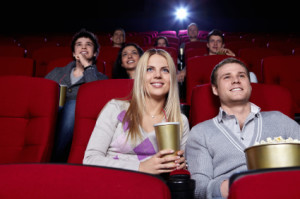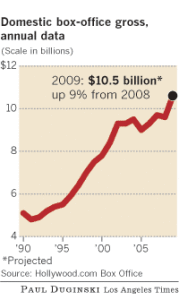Conventional economic wisdom suggests that during recessionary times, most industries will suffer. During recessions, the real estate, retail and other major markets tend to make less money than usual as people are hesitant to make unnecessary or major purchases when times are tough. However, historical patterns suggest that one nonessential commodity does surprisingly well during recessions: movies.
According to the National Association of Theater Owners, box office ticket sales increased in the five recession years before 2008 (Kiplinger). Despite being one of the worst years of the Great Recession, the number of movie tickets sold in the first quarter of 2009 increased more than 9 percent from 2008 (Washington Post). This phenomenon is not a new development. Movies have been performing well during economic turbulence since the Great Depression, when Gone With The Wind (the highest-grossing movie of all time when adjusted for inflation) and King Kong broke box office attendance records despite staggering unemployment rates. Meanwhile, 2005 was a rough year for Hollywood while the economy in general, powered by the housing bubble, performed very well.
At first glance, it is not logical for movies to perform well during recessions because they are not necessary for survival and are an easy expense to cut. The reason behind this cannot be explained by simple supply and demand graphs, but makes sense with a bit of behavioral economics. During tough times, people need to be entertained more than usual to distract themselves. The economic worry and unemployment caused by a recession creates more people needing distraction than usual. Movies are a great opportunity to escape from reality for a few hours at a relatively low cost.
The type of movies that perform well during difficult economic periods lend credence to the the idea that the box office is counter cyclical to the economy at large. According to the president of Box Office Mojo, Brandon Gray, “Comedies and epics tend to do really well at the box office during economic downturns.” (Fortune) This is because these genres fit into the escapism category that people seek out during economic difficulty. In the box office summer following the terrorist attacks of 9/11, Spider-Man brought in $403.7 domestically (Fortune). In the midst of the Great Recession, The Dark Knight broke the record for an opening weekend and ultimately made over $1 billion (Fortune). It is no coincidence that both of these movies feature likable heroes and themes of overcoming adversity. Additionally, the light-hearted comedies Step Brothers, Pineapple Express and Tropic Thunder were major hits during the summer of 2008. Despite ticket prices hitting an all-time high in 2015, the average ticket price of $8.61 still offers a relatively cheap entertainment alternative to dinners, bars or concerts (Slashfilm).
Unfortunately for economists, box office revenue is a trailing indicator. It does not help predict economic developments because increased ticket sales are people reacting to a recession when it has already taken effect. Still, the correlation between box office sales and the economy demonstrates that economic decisions are largely dependent on human psychology. It may not make sense for people to spend valuable income on something as superfluous as a movie during a recession, but the desire for entertainment can overcome logical decision making.
Sources:
http://archive.fortune.com/2008/08/21/news/companies/Movies.fortune/index.htm
http://www.kiplinger.com/article/business/T019-C000-S001-10-quirky-economic-indicators.html
http://www.washingtonpost.com/wp-dyn/content/article/2009/07/11/AR2009071100677.html
http://www.slashfilm.com/average-us-movie-ticket-price/


Leave a Reply
You must be logged in to post a comment.